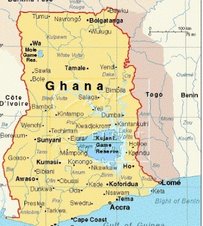Upon learning that I would be attending Yale University's PIER-African Studies Summer Institute on The Teaching of Africa in July of 2006, I was very excited because I really love the opportunities to learn more about any subject that I will be teaching. The primary reason I applied to attend this workshop was to help myself develop a new class on African Studies. I had always had an interest in Africa primarily because I played soccer with many Africans throughout my life including my roomate in college, Yohannes Worede from Ethiopia. I had also played soccer with men from Nigeria, Sierra Leone, The Gambia, Egypt and South Africa. I found the men to be very interesting and very worldly. When I arrived in New Haven to take the course I knew that I would be exposed to a lot of information, but there was no way I could have known how intense the 10 days would be.
During the first day of the first session the program's director Maxwell Amoh greeted us with a welcome and some details of things we would need to know from a "nuts and bolts" perspective and he then captured my interest with three Akan proverbs. The Akan are a group of people who hail from many parts of West Africa including the area around the city of Kumasi in the nation of Ghana. The Akan make up a significant portion of Ghana's population today. The proverbs and their meanings embody the essencse of why this course and this trip to Ghana appeal to me.
The first proverb that Max uttered was "one must come out of one's house to begin learning." This proverb should remind us of the importance of getting rid of ignorance and misinformation. In a world that often seems very sick it is important that each person in the world does his or her best to understand others. As I have told people of this upcoming trip I am reminded of the streotypes people still have concerning places in Africa. People have made comments like "don't get hit with a poison dart" and "watch out for the wild animals." So, I am leaving "my house" and visiting a new one.
The second proverb was, "If you have not been outside your own farm, you cannot say that you are the only farmer." This proverb teaches us the importance of being careful about your own arrogance. I think the world often suffers dissension because people make the mistake of assuming that their way of doing things is the best. This proverb begs us to be open-minded and to try to learn through personal experiences. I hope I can do this while I am visiting Ghana, and more importantly I hope I can pass this message on to my students in the future.
The final of Max's three introductory proverbs was, "Truth is like a baobab tree, one persons arms cannot embrace it." I strongly encourage you to find a picture of a baobab tree to increase your understanding of this proverb. The truth is such a full story. There are so many perspectives on it. Can one persons version of the truth ever be correct? This proverb should also cause one to consider the unkown. What would another participant write about the first meeting we all had together in New Haven last July 6? Would it have the same twist as what I am writing? Certainly for me, there is a lot of "unknown" ahead of me in the next six weeks. I welcome it and invite you to check in with me here while I add these posts.
As our departue approaches I grow more and more excited about the opportunity before me. From the first day of the class last summer Max referred to us as a family. I feel a connection to the professionals that I shared ten intense days of study with followed by four follow up sessions during the '06/'07 school year. Every session we had, whether it was on the geography of the continent or on the politics of developing nations, was intriguing on many levels. The quality of my experience with this group of people has thus far been excellent, and I anticipate a fabulous six weeks.
Saturday, June 30, 2007
Subscribe to:
Posts (Atom)




